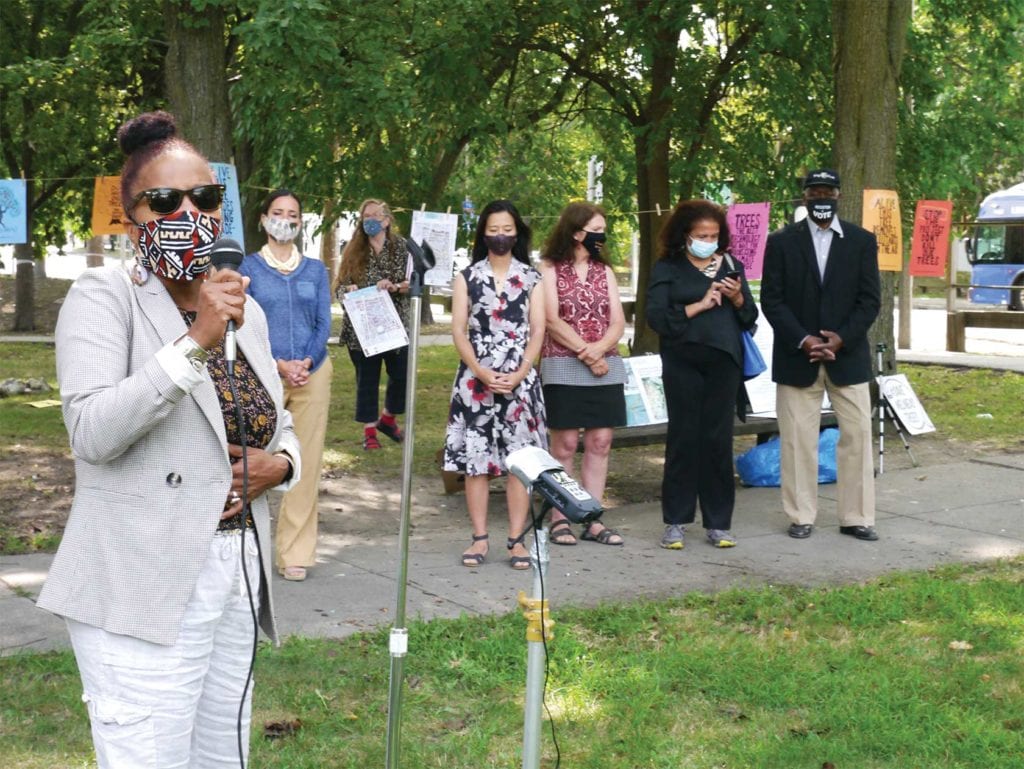Electeds join effort to save Melnea Cass trees
Roxbury residents call on city to scale back plans

Roxbury residents fighting city and state officials’ plans to remove more than 100 mature trees on Melnea Cass Boulevard scored a victory last week when city officials agreed to pause the construction project, which is aimed at widening sections of the roadway.
Activists with Friends of Melnea Cass Boulevard gathered Monday with state Sen. Sonia Chang-Diaz and city councilors Kim Janey and Michelle Wu to call on city officials to revise their plans for the roadway.
“We must never forget that this boulevard was created by structural racism,” Janey said, citing the 1960s highway project that led to the demolition of hundreds of homes in the Lower Roxbury community.
While state officials abandoned their plans for an inner belt highway and the extension of Interstate 95 through Boston’s neighborhoods after neighborhood residents led a years-long campaign that derailed the project, Melnea Cass Boulevard was constructed in 1981, following part of the path that the inner belt highway would have taken through Roxbury.
That year, state officials planted the trees that now add shade along the stretch. About a quarter of the trees have been scheduled for removal this year as part of a state project that would add left turn lanes to the boulevard, widening the intersections of the roadway.
The Massachusetts Department of Transportation and the Boston Transportation Department have been planning the reconstruction of the roadway since 2011. The city and state plan to tap $35 million of federal, state and city funding for the project.
Roxbury activists have voiced opposition to the plan from the beginning, citing what they said would be unsafe street crossings and the loss of trees that help mitigate pollution and reduce extreme temperatures.
“Cutting down the trees will exacerbate existing conditions like asthma that disproportionately affect this community,” said Brita Lundberg, a doctor and member of the group Climate Code Blue.
Lundberg noted that Lower Roxbury has fewer trees than other parts of the city and that residents of the neighborhood are at risk of suffering higher incidences of heat stroke and heat exhaustion. The city’s Climate Ready Boston plan showed Melnea Cass Boulevard runs through a “heat island,” a portion of the city where temperatures are markedly higher than elsewhere in Boston.
The plans for the expansion of Melnea Cass Boulevard are aimed at reducing and calming traffic along the roadway, which connects the Longwood Medical Area and the Fenway to the Southeast Expressway and Logan Airport.
Roxbury resident Linda Freeman noted that there is significantly more congestion at the end of the boulevard, near where it meets Columbus Avenue and its beginning at Massachusetts Avenue.
“If they open up the lanes, traffic will bottleneck there and it will bottleneck there,” she said, gesturing toward Columbus and Massachusetts Avenues.
“Traffic flow does not trump Black people’s health,” said Dwaign Tyndall, executive director of the Roxbury-based environmental justice group Alternatives for Community and Environment. “The city has enough talented planners to figure this out without harming the Black community.”
Janey and Wu said they have requested that city officials hold a hearing on the removal of the trees, a standard practice elsewhere in the city. While city officials said they plan to plant new trees to replace the ones being removed for the project, Chang-Diaz said the new trees would take decades to replace the 40-year-old trees being removed.
“If we lose this canopy, my children will be grown before we see it fully restored,” she said.






